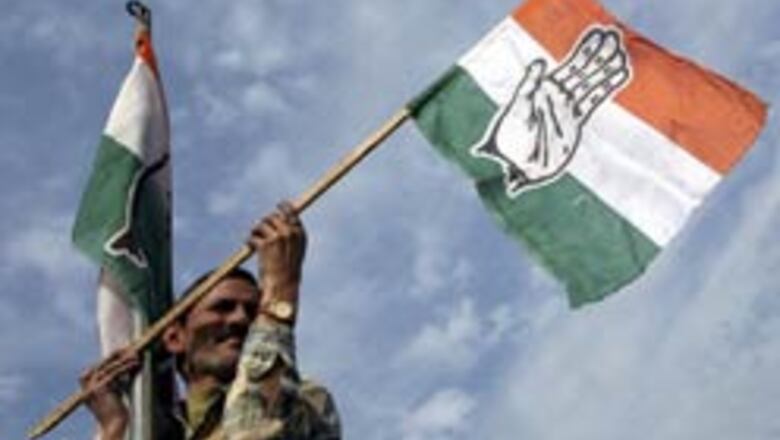
views
New Delhi: The ‘mini-general’ elections in five states have thrown up a mixed verdict for the country’s two main political parties: Congress won in three states on Monday and the BJP two.
The Congress retained power for a record third five-year term in Delhi, wrested Mizoram and ousted the BJP in Rajasthan while losing to it decisively in Madhya Pradesh and Chhattisgarh in elections that were the last popularity test ahead of the Lok Sabha battle.
BJP supporters celebrated in Chhattisgarh and Madhya Pradesh, but party leaders admitted that the results were disappointing, especially the rout in Delhi where they had been confident of ending 10 years of Congress rule, more so since voting in all states barring Chhattisgarh took place in the shadow of the Mumbai terror carnage.
The outcome of the staggered elections between November 14 and December 4 sparked off speculation about early Lok Sabha elections, but Congress leader Digvijay Singh of the Congress argued against it.
The Congress’ most important victory came in Delhi where Chief Minister Sheila Dikshit crushed the BJP, winning 42 seats in the 70-member house with results yet to be declared from four constituencies.
In Rajasthan’s 200-member legislature, the Congress emerged the largest party winning 96 seats and was set to form the Government taking help from among 25 independents including rebels from its own ranks.
And in northeastern Mizoram, the Congress ended the Mizo National Front's (MNF) 10-year reign by winning 32 of the 40 assembly seats.
But the Congress was routed in Madhya Pradesh, where the BJP, led by Chief Minister Shivraj Chouhan bagged 142 of the 230 seats. In neighbouring Chhattisgarh, the BJP overcame hours of suspense during counting to emerge the winner with 50 seats in its kitty -- of the state legislature's 90.
Political analyst G V L. Narasimha Rao, however, warned that there was no cause for cheer for the BJP or the Congress following the results.
"The Congress is certainly doing better than expected but not as well as they should have done to win a national election," Rao said. "The BJP is doing worse than expected and does not look like it is in the lead to come to power nationally."
PAGE_BREAK
But the Congress was buoyant. "There is no stopping the Congress now," claimed Congress leader M Veerappa Moily, chief of the Congress’ media cell.
BJP leaders admitted privately that they would rethink their Lok Sabha strategy because the issue of terrorism they had raked against the Congress government of Prime Minister Manmohan Singh after the November 26 Mumbai terror attacks and the arrests of Hindu activists following the earlier Malegaon bombings had failed to pay dividends.
"We are going to analyse these results," a sombre BJP spokesperson Prakash Javadekar said.
The biggest hero on Monday turned out to be Dikshit, a grandmother who became the first woman in India to lead a party to an assembly election victory for a third term.
As thousands gathered outsider her residence shouting slogans, beating drums and bursting crackers, a beaming Dikshit flashed the V sign and declared: "The results are great!"
Even Congress leaders who are normally used to hailing only Sonia Gandhi after every electoral victory gave due credit to Dikshit. "She has done a marvellous job," Moily said, echoing a popular sentiment.
In Rajasthan, BJP leaders blamed the loss on infighting in party ranks. But even as the Congress prepared to take power, all its chief ministerial hopefuls barring former chief minister Ashok Gehlot were defeated.
The Congress too blamed its loss in Chhattisgarh to factionalism in its ranks while analysts credited it to BJP Chief Minister Raman Singh and his "Mr Clean" image.
In Madhya Pradesh, BJP Chief Minister Shivraj Chouhan's popularity eclipsed the Congress, which projected Suresh Pachouri, who many saw as an "outsider", as the chief ministerial candidate.
Also in Madhya Pradesh, former chief minister and Bharatiya Jan Shakti (BJS) founder president Uma Bharati lost from the Tikamgarh seat, her home turf.
Analyst Rao asked the BJP to read the writing on the wall ahead of the Lok Sabha polls due in April-May.
"The BJP will have to revise its strategy and come up with something instead of finding faults with the ruling party," he said. "But the result will set a momentum for the Lok Sabha elections."
The elections in Rajasthan and Delhi were held after the attacks in Mumbai by militants. But criticism of the government for security lapses appeared to have little impact on voters. "The BJP's terror plank hasn't worked. People have started to see through it. Ironically it backfired after the most horrific terror attacks," said political analyst Amulya Ganguli.
Even before the blood had been mopped up from the three-day rampage in India's financial capital, the BJP took out front-page advertisements slamming Congress as unable to defend the nation. Local governance issues may have trumped the economy and security this time around. "It shows the maturity of voters," said Yashwant Deshmukh, head of the C-voter polling agency.
"They may not like Congress nationally but they have not been influenced by events like the attacks in Mumbai. They have voted for good local leaders." Whoever does best in the state elections may find it easier to secure alliances with regional parties before the national election, crucial to building a post-election coalition.
(With inputs from IANS and Reuters)




















Comments
0 comment